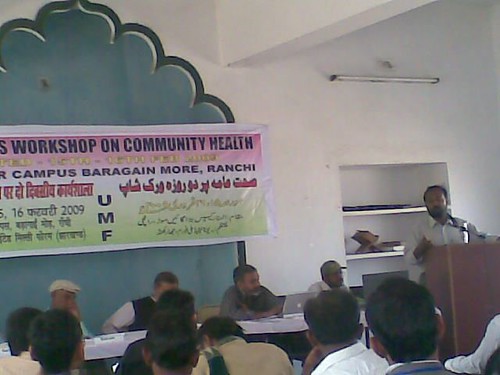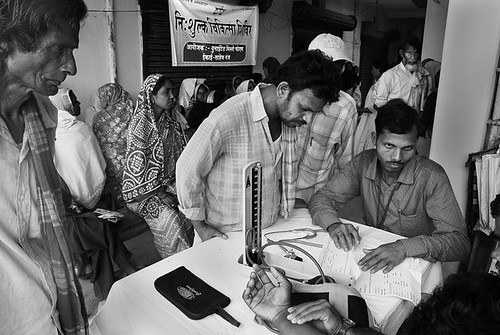By Mumtaz Alam Falahi, TwoCircles.net,
Patna: It all started with a two-day workshop on community health in Ranchi – the capital of Jharkhand state in North India – in February 2009. The organizers wanted to train youths for community health services in local villages which had little or no public health facilities. Encouraged with the success, they now want to expand the small initiative.
“On 15 and 16 of February 2009 over 120 youth, both boys and girls, gathered at the Al Manar campus in Ranchi for the two-day workshop on ‘Community Health’. Organised by the United Milli Forum of Jharkhand the immediate purpose of the workshop was to mobilize young people to get trained and start intervening directly in the field of community health, especially in areas where there are little or no public health services at all,” says Arshad Ajmal, the brain behind the initiative and member of United Milli Forum.
But the organizers had in mind that they will turn it into a movement in Jharkhand and rest of the country “to address the social, political and economic factors that deprive a bulk of Indian citizens of their basic right to good health.”

After the workshop, the participants of the workshop were taken to Islampur slum area of the city for them to have hands-on experience of the health situation among low-income populations. A medical camp was also organized there.
While United Milli Forum was key behind the initiative, it also got support from members of various civil society groups in Jharkhand, West Bengal and Bihar. Representatives of the Ethical Medical Forum and Solidarity Youth Movement of Kerala were also present when the initiative was unfolding.
As a follow-up to the workshop, participants were offered two-month training in community health provided by the Shramajibi Swasthya Udyog a registered organization of doctors and health workers based in Chengail outside the city of Kolkata, West Bengal. The first batch of 9 male students completed their training on 15 August 2009. Since then another group of 10 boys and 10 girls have been trained. They are completing training this month of July. Among these trainees are associates of United Milli Forum as well as some Adivasi boys and girls from Jadugoda, Jharkhand.
In the two-month training program, the trainees were taught to diagnose common health problems and to how to treat them. “Basically the intention is to equip them so that they can work effectively in places where there is no doctor. Students are being provided with community health training literature in Hindi to facilitate their understanding of the subjects being taught,” explains Ajmal.
Once trained the community health workers are expected to go back to their respective home towns/rural areas and start working with communities to improve public health conditions or do educational/awareness raising work for this purpose.
All the health worker trainees so far have gone back to their respective villages and started work on primary health care among the people there. Many of them have participated in medical camps organized by the United Milli Forum jointly with the Shramjibi Swasthya Udyog in Ranchi and Gumani (Sahebganj Dist.)
The cost of this two month-training program is working out to be Rs 3000 per student, including their travel, lodging, boarding and pocket expenses. The funds for the training, since the inception of the program, have been contributed by the United Milli Forum while the Shramjibi Swasthya Udyog trains the students for free while charging only for their food expenses.

With a view to providing more field experience to the health worker trainees attempts are being made to place them as interns with hospitals and projects working on public health issues in different parts of the country.
The organizers are planning to send three of the health workers to Ganiyari, a highly backward area in Chhattisgarh for a nine-month-long Senior Health Worker training program being conducted by the Jan Swasthya Sahyog, a community health program. The cost of the boarding, lodging and miscellaneous expenses for the trainees works out to be roughly Rs. 3000 per month. Jan Swasthya has offered to waive the fee of Rs. 15,000 per student for the course.
“We are convinced that the course will benefit our students immensely and equipped with these additional skills and knowledge they can in turn contribute a lot to their communities back in Jharkhand,” says Ajmal.
So far the entire program has been managed by the internal funds of Milli Forum, but now to expand the program and further training of the health workers they need financial support.
“While we have been running the training program so far through internal funds we will now require some contributions from individual citizens also. Our proposal is to build a network of supporters for the Initiative for a Healthy India who will contribute Rs. 3000 per year towards the costs of training our students in Chengail or towards the costs of sending them for further training elsewhere,” he says.
Therefore, the Forum has appealed “to all our friends and supporters as well as those interested in furthering the cause of public health to come forward and contribute.”
Contact:
United Milli Forum,
Badagaon Mod, Booty Mod,
Ranchi
[email protected]

